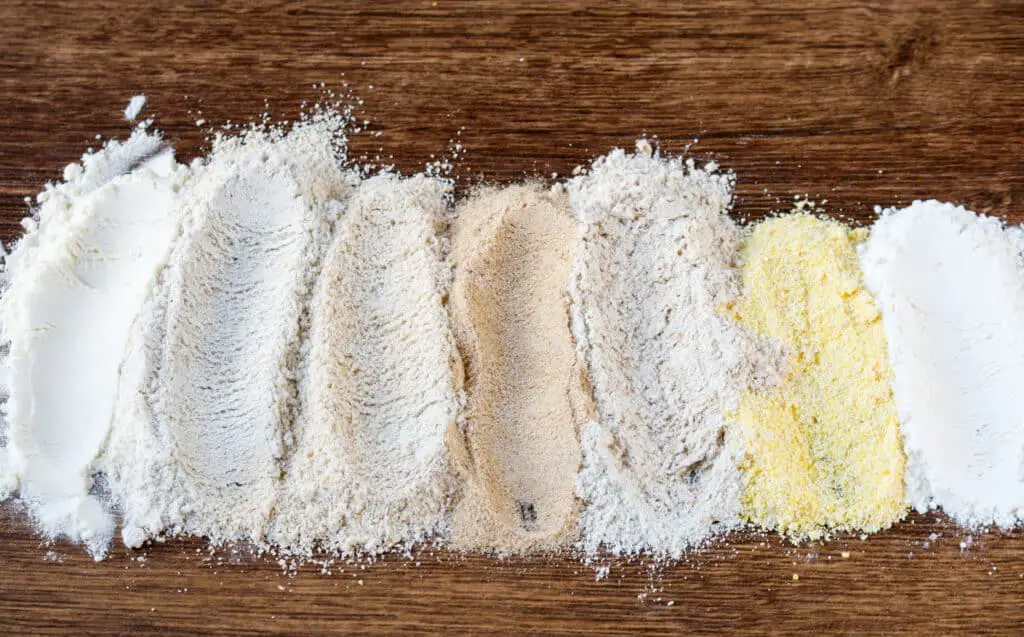If you love baking, you know that there are different types of flour. Pastry flour is the most popular flour among professional bakers as it makes the yummiest and softest desserts. So why is it preferred to other types of flour when it comes to baking? Let’s find out.
What Is Pastry Flour?
Pastry flour is a baking flour that is made of soft winter wheat. The flour has a low protein (gluten) content ranging between 8 to 10 percent. Because of the low gluten, desserts made from this flour have a lighter and more delicate texture, making them soft to chew and easily digestible. It is used together with baking powder, which acts as the leavening agent.
This flour is extremely versatile. You can use it to make all kinds of desserts, including:
- Pie crust
- Cinnamon rolls
- Pancakes
- Tarts
- Cakes
- Cookies
- Muffins
- Pastries

Historical Origins of Pastry Flour
We can thank the early Egyptians for the first pastries. This colossal achievement came about when the Egyptians mixed flour and water to make a paste that was used to cover meat. Later, pastries gained popularity in the Middle East and Europe. By the 1600s, people were making different types of pastries, one of the most popular being flaky pastry, also referred to as baklava.
Pastries then became a standing tradition in many parts of Asia, where bakers make different types of pastries using different kinds of flour, adding fruit, sesame and sweet bean paste fillings.
Well-Known Brands of Pastry Flour
There are many different brands of pastry flour in the market, and each contains varying protein content levels so do pay attention to the labeling. Some of the most popular brands include:
Bob’s Red Mill
Bob’s Red Mill is an extremely reputable brand and is very popular among avid bakers. This is because they offer different types of pastry flour. These include:
Whole wheat pastry flour
This wheat is 100% stone ground and is available in 5 lb packages. It is made from soft winter wheat, and retains bran and germ nutrients. It is used to make quickbreads, pastries, pie crust, cookies, and muffins.
It can be used together with baking powder as the leavening agent. Note though that it cannot be used with yeast because of the low protein content. This flour is vegan as it does not have any eggs, dairy or honey.
Organic whole wheat pastry flour
It has a protein content of 9 percent and is made of unbleached soft wheat flour. The wheat is grown organically and is sourced from high mountain valleys of family-owned farms. This pastry flour does not have any additives, is GMO-free, and is certified Kosher. Organic pastry flour is best for cakes, cookies, pie crusts, and tarts.
Unbleached fine pastry flour
This flour is ideal for white pastry lovers. It comes in a 5-pound package, and contains folic acid, riboflavin, and other vital nutrients, which are suitable for your health. Folic acid helps increase blood cells, while riboflavin helps break down the protein content bond, making the baked goods easily digestible. You can use it to make pancakes, pie crusts, brownies, and muffins.
Great River Organic Milling
This brand produces quality flour which is stone ground. Their flour is made from non-GMO and organically grown soft winter wheat. The flour has a creamy white texture and retains some bran to enhance the flavor. Great River uses natural granite millstones to enhance its quality, taste, and nutritional value. It is best used to make quickbreads, muffins, pancakes, cakes, pies, and cookies.
Blends by Orly
This brand produces four blends of gluten-free pastry flour. Each blend is designed for different cooking and baking applications. So before buying Blends by Orly, ensure that you know what you want to ensure the best result.
Le Cordon Bleu uses high-quality ingredients to create each blend, so if you want to bake a cake, cookies, or pie crust, there is a flour blend for that purpose. Their products are gluten-free, Kosher certified. GMO-free and vegan.
Food to Live
This is the most affordable brand of pastry flour and produces delicate and tender pastries. It goes well with pastries that don’t need rising. This flour has a low gluten content of 8-9% and is fantastic for pie crusts, homemade pasta, and noodles.
It is available in a 12 ounce package. It is vegan-friendly and Kosher certified.
How is Pastry Flour Made?
Pastry flour is made from soft winter wheat. If you can’t find it in your shops, you can make it from the comfort of your home. You just need all-purpose flour and cake flour. This is because pastry flour is an intermediate of both.
Use both flours in the ratio of 1:1 to get pastry flour. If you find that the resulting dough is too tender, change the ratios into 2/3 all-purpose flour and 1/3 of cake flour. This will make your dough a bit sturdier such that your desserts will hold their fillings.
However, if you do not have cake flour, you can use 1/3 of whole wheat flour with 2/3 of all-purpose flour.

What Does it Taste Like?
Pastry flour is used to make delicate and soft desserts that melt in your mouth. This flour in its raw form, however, does not have a specific taste as it is finely milled, removing the bran and germ. However, whole wheat pastry flour has a nutty taste as it retains the bran, germ, and endosperm, which enriches its flavor and nutrients.
What Does It Smell Like?
Fresh pastry flour has a neutral smell that is pleasant to your nose. But once it goes bad, it has a sour or musty smell.
You may assume since flour is a dry ingredient, it might last forever, but that is not true because once its shelf life has expired, it should be disposed of. The majority of wheat flours have a shelf life of three months.
How Is Pastry Flour Different From Other Types of Flour?
Pastry flour is different from other flours as it has a low protein content ranging between 8 to 10 percent. Compared to all-purpose flour, this flour has a more delicate texture and lower protein content.
On the other hand, when compared to cake flour, it is not as fine but has almost similar levels of protein content. For a better idea of the range of protein content in different flours, check out the list below.
- Pastry flour: 8 – 9%
- Cake flour: 5 – 8%
- Bread flour: 12 – 13%
- All-purpose flour: 9 – 12%
- Self-rising: 9 – 11%
- Whole wheat: 14%
- High Gluten: 14 -15%

What are Some Substitutes for Pastry Flour?
If you can’t find pastry flour in the shops near you, don’t panic, as you can substitute it with whole wheat pastry flour or all-purpose flour, depending on what you are baking. But the best option is making homemade pastry flour.
You may be asking, is it possible? Yes, and very easy. You just need one part all-purpose flour and one part cake flour. Mix them well, and voila! The protein content of cake flour and all-purpose flour meets in the middle, creating a perfect pastry flour blend.
If you don’t want to use wheat flour, you can substitute pastry flour made from organic brown rice or ancient grains. Some of the brands selling these substitutes include Blend by Orly and Jovial foods.
Whole Wheat Pastry Flour
Whole wheat pastry flour is made using the entire wheat kernel. This means that it is not processed entirely as it retains the bran, germ, and endosperm, making it more nutritious. Therefore, it gives the flour a nutty and slightly dense texture.
Like pastry flour, this flour has a lower protein content than all-purpose flour; that’s why it’s a good substitute for cake flour when making homemade pastry flour. Compared to all-purpose flour, whole wheat is better as it produces lighter pastries.
Whole wheat pastry flour is highly nutritious as it contains a high fiber content and does not have additives such as niacin, iron, folic acid, and riboflavin. Therefore, if you don’t have pastry flour, you can substitute it with whole wheat pastry flour.
To Sum Up
If you have run out of pastry flour, don’t fret as you can make it using cake flour and all-purpose; just follow the measurements carefully.
So what are you waiting for? Get your flour and start making the most delicate and yummiest desserts for your family and friends.
